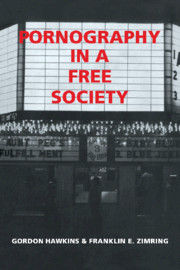Book contents
- Frontmatter
- Contents
- List of tables and figures
- Preface
- Acknowledgments
- I Pornography and the pornography commissions
- Introduction
- 1 Experts on what? The origins and composition of pornography commissions
- 2 On definitions
- 3 The nature and distribution of pornography in the United States
- 4 Pornographic communication and social harm: a review of the reviews
- 5 Freedom of expression and the public law of pornography
- II Public policy after liberalization
- References
- Index
5 - Freedom of expression and the public law of pornography
Published online by Cambridge University Press: 21 October 2009
- Frontmatter
- Contents
- List of tables and figures
- Preface
- Acknowledgments
- I Pornography and the pornography commissions
- Introduction
- 1 Experts on what? The origins and composition of pornography commissions
- 2 On definitions
- 3 The nature and distribution of pornography in the United States
- 4 Pornographic communication and social harm: a review of the reviews
- 5 Freedom of expression and the public law of pornography
- II Public policy after liberalization
- References
- Index
Summary
This chapter examines the issues that emerge when a society that values free expression is also concerned about pornographic communication. In any country where freedom of expression is regarded as important, whether or not it is constitutionally guaranteed, it is recognized that some balance must be struck between the right to free expression and the right of government to prohibit or restrict the publication and distribution of material deemed harmful to individual citizens or to society. How that task is affected by the protections accorded to free expression by the First and Fourteenth Amendments to the U.S. Constitution is one of the issues to be explored here, as we examine how the three commission reports under review addressed these issues. Our intention in this chapter is to survey a great deal more than the constraints or restrictions imposed by the First Amendment on the regulation of pornography in the United States.
The first section of this chapter looks at the way in which pornography may implicate values of free expression and the potential harms pornography may cause. We attempt to construct an inventory of free-expression values and countervailing social harms from which a balancing of these interests may occur. The chapter's second section describes how the Williams Committee weighed the competing values in its report. The third section contrasts the two U.S. commissions’ reports with each other and with the Williams Committee report.
- Type
- Chapter
- Information
- Pornography in a Free Society , pp. 109 - 146Publisher: Cambridge University PressPrint publication year: 1989

